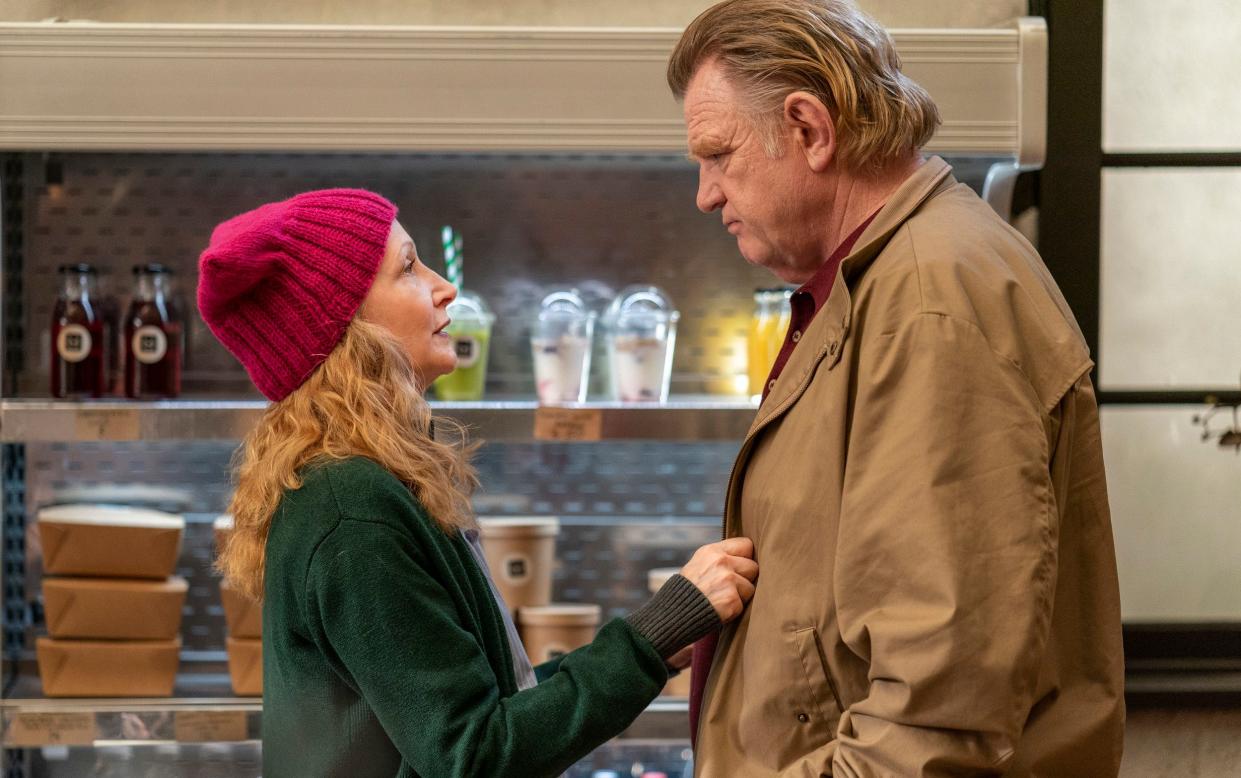State of the Union, series 2, review: Nick Hornby plunges into the culture wars

Episode run-times are sprawling ever longer. The upcoming season of sci-fi drama Stranger Things boasts a two-and-a-half-hour instalment, dwarfing many feature films. Happily for viewers with busy schedules, Nick Hornby’s bite-size comedy State of the Union (BBC Two) bucks that trend with its zesty 10-minute morsels about a couple in marital therapy.
Or, more accurately, that couple convening in the same watering hole before each weekly session. In the show’s first, multi-Emmy Award-winning series in 2019, that was Chris O’Dowd and Rosamund Pike’s beleaguered but loving pair seeking Dutch courage in a west London pub. Brexit conflict gave the title a double meaning, but, mercifully, didn’t feature too much.
Now we’ve zipped across the Pond to a much more combative set-up. Scott (Brendan Gleeson) and Ellen (Patricia Clarkson) meet at a hipster coffee shop in Connecticut, whose impenetrable menu and non-binary barista, Jay, immediately rile Scott. But then they would: he’s an aggressively conservative “family guy”, while Ellen is a judgmental liberal campaigner who gets arrested while on environmental protests.
Yes, Hornby has plunged head first into the culture wars. It makes the opening chapters close to unwatchable, as Scott huffs about Jay’s pronouns, claims his affairs were a product of a different time, and, after defending his preference for cow’s milk over trendy alternatives, lactose issues be damned, frets that the smells of his childhood are disappearing: gasoline, tobacco, meat, farts. That’s right: his nostalgia extends to flatulence.
Ellen is less cartoonish but still insufferable. She’s omitted to tell Scott that she’s secretly become a Quaker and started financially sponsoring a Somalian teenager, and she claims to have prison wisdom after being locked up a matter of hours. How on earth, you wonder, have this obviously incompatible pair survived 30 years of marriage, and how soon can they divorce?

Thankfully – and here’s the benefit of 10-minute episodes – the excellent Gleeson and Clarkson eventually breathe life into those stock characters. The pleasure of this intimate, theatrical format is that places such focus on the performances. Quite literally, as Stephen Frears’s sensitive direction is full of revealing close-ups, although it avoids feeling too stagey by matching the rapid rhythm of Hornby’s wittier exchanges in its crisp editing.
Clarkson draws out the hypocrisy and heartbreak of her touch-feely progressive, who is using therapy as a calculated escape route. She even admits she fantasised about Scott dying so she could avoid the agonising process of separation. Her dawning spirituality is under-explored by Hornby, but the yearning for meaning in her life, and determination to write a new chapter instead of sinking into empty-nester malaise, comes across strongly.
Gleeson, though his American accent is wobbly, pulls off the magic trick of making his initially irredeemable baby boomer the hero of the tale. Though he certainly gets an assist from Hornby, who, in a spot of writing as therapy, seems to be similarly renegotiating his place in a changing world. “I always presumed there were millions like me,” sighs Scott in a poignant moment of self-reflection. His is the richer journey as he opens up to new experiences, while making peace with the fact that his passion is for the past – whether jazz records or Civil War battlefields. It’s a charming, genuinely affecting turn from Gleeson.
However, these trysts have an awkward third wheel. Esco Jouley’s Jay is constantly employed as a measure of Scott’s woke progress and occasional indictment of Ellen’s blind spots. Though art apparently imitates life here, with Gleeson speaking about his “eye-opening”, educational experience in working with a non-binary actor, it just feels lazy dramatically. Jay and Jouley deserve better.
It’s a duff note in a show that otherwise strips away labels and identity politics to encourage empathy for both parties – and in record time.

 Yahoo News
Yahoo News 
